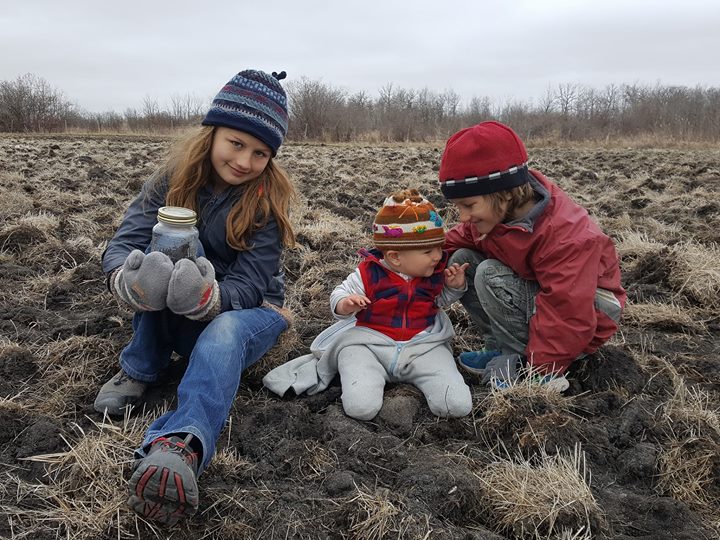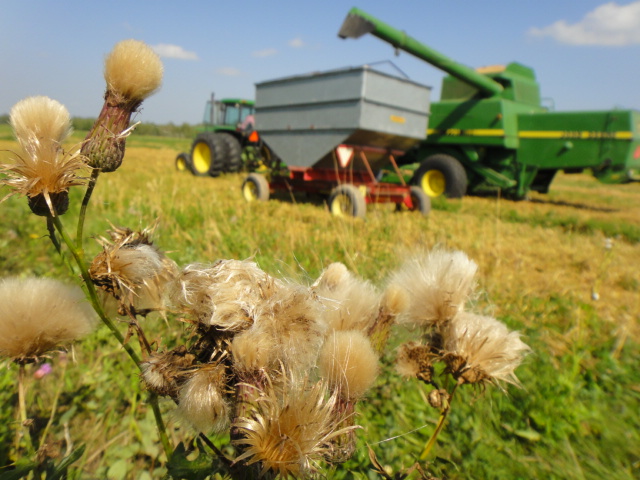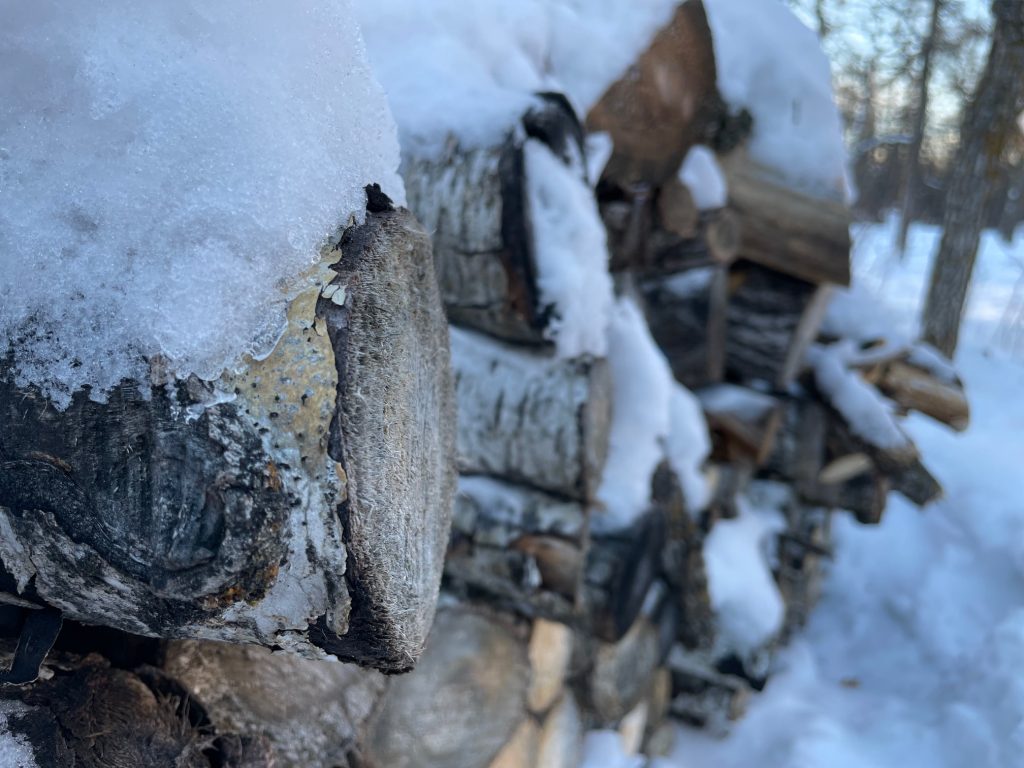
Adagio Acres is a small farm of 240 acres located in the Interlake region of Manitoba. Our crops are grown organically, so we rely on long rotations with perennial grasses to manage weeds and build soil health instead of using chemicals, and fertilize our fields with manure to help close the nutrient loop.
We also place high value on natural biodiversity and maintaining natural habitat for wildlife, so our small fields are interspersed with marshland and forests, making them excellent habitat for deer, elk, coyotes, birds, and insects.

Our organic certification is just part of the picture though, and we take every measure possible to ensure that everything we do has the health of our environment in mind. We are proud to be part of the movement of organic growers who are dedicated to using agricultural methods that enhance the health of the soil, knowing that is the foundation for healthy bugs, birds, water, animals…and us.
The land on which we grow our crops is our children’s kite-flying field and our favourite destination for an evening walk. We can see the interconnectedness of our own personal wellbeing and the health of the land we live on, and we believe that organic land management, together with regenerative agricultural practices, are essential in forging a path towards a sustainable future.

A collection of rambling thoughts…

Happy winter from all of us at Adagio Acres! I hope that this snowy season has brought moments of awe into your days. For myself, the beginning of winter has been good for my soul, as i’ve been spending more of my time hauling water and straw to keep our animals safe and dry, shoveling snow, and chopping wood for evening fires.
The first morning that we were walloped with snow, I dragged out 2 cardboard boxes of bean plants that I had pulled from my backyard garden before the frost, and spent the next hour shelling beans. A few handfuls of green and yellow wax beans to tuck into the soil again in the spring, and a few dozen plants of Speckled Algonquin beans. The end result is more than what I will need for myself to plant in the spring, but barely enough for a pot of chili. I thought back to the number of times I had weeded those rows of beans, hauled the sprinkler to water them, and fixed holes in the fence to keep out the chickens, goats and deer. That same afternoon, I went to the mill and cleaned and sorted hundreds of pounds of pinto beans in just a few hours. The difference in what we can accomplish with the energy of gas and electricity to run tractors and power industrial equipment is mind boggling. But it didn’t make me value my few handfuls of garden beans any less. There is nothing that I would rather have done with my time.
I listened to a lecture by writer Andrew Nikiforuk the other day. He defined a concept that he refers to as “oil slaves,” that we exploit the energy of oil and gas in the same way that society used to exploit the work of human slaves. The moral imperative to end this relationship may be different, but the impacts on the slave-holders are similar. A dissociation between the work that we do and the benefits that we enjoy. Feelings of entitlement, yet declining contentment with life. A division in society that leads to lack of empathy and understanding. Nikiforuk described a similar paradox where a tomato grown under industrial agricultural systems requires far more energy to grow and distribute than it gives in calories. When this energy is embodied in gardening – an activity that feeds the soul and strengthens the body, this is a beautiful tradeoff. When that energy comes from a substance that destroys the land and the people who live on it, we might need to re-evaluate the equation.
A book just published by Manitoba organic farmer David Rourke describes what a transition to fossil-fuel-free farming might look like. It would be a difficult task with hurdles along the way, but there are so many farmers here in our province who are doing the work of re-envisioning their farming practices in a way that benefits the land, and I am proud to be working with so many of them as we bring you these grain bundles. Let’s be clear, the crops were not planted by hand and weeded with a hoe, these farming systems are still relying on the energy of oil and gas, but they have all eliminated chemical inputs, and are finding synergies with the land to increase nutrients, build soil carbon, restore biodiversity, maintain water retention, and enable resilience. This is such important work, and I am excited to see where it will take us as we learn to find balance, both in our lives and in our systems of food production.

After much debate: “how beneficial is grasshopper poo for our fields if we just let them eat all the oats?” “If they lay their eggs in the field will they be destroyed when we disc in the spring?” “Could we find 2,000 chickens and let them loose to get fat on a hopper banquet?”
But in the end, we’re calling uncle. The grasshoppers have the final say this summer. The oats (or what’s left of them…) have been cut down as hay for the horses.
Natural cycles can be destructive and difficult.
10 years ago when we wanted to start farming there were ducks swimming on our fields and we couldn’t even plant in the spring. Since then, we’ve done a lot of advance planning to keep a year ahead with our oat supply and spread out our risk. Crop insurance doesn’t help keep our business alive, so instead of insurance, we bought extra grain bins. So we should have enough oats to keep milling through next winter even without a crop to harvest this year.
It will be difficult (and expensive) to get ahead again, but we’re not giving up. And the debate that it has fuelled is an important one. How do we plan for more resilient cropping systems? Are there ways to increase biodiversity in order to help cycles balance with each other? What can we do differently next year to help the land recover? We will keep pondering. It’s important to have both moments of sober disappointment, and moments of optimism for the future of sustainable farming.